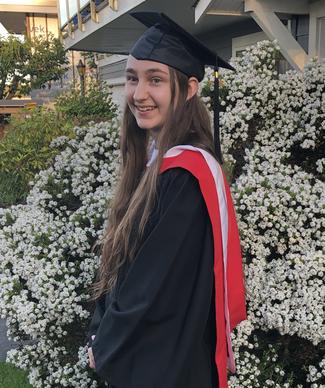Kassandra Robicheau, Essay Contest Winner in the Upper-level Category, 2021-2022

Has completed her BA (Honours) in English at VIU and has begun the MA programme at Dalhousie University. She has always loved reading and writing, but she finds literary analysis “fascinating,” noting, “uncovering meaning, then mucking through it all to pull together threads and create an argument… is so rewarding.”
She was drawn to Dr. Cynthea Masson’s course on the Black Mirror series -- ENGL 394: Topics in Television Narrative -- because it offered her the opportunity to “apply techniques for studying texts with audiovisual components” while also providing “easy contact points for applying more traditional literary analysis and theory.” It was this course that led to her award-winning essay, “Invisible yet Omnipresent: The Future of Disability as Reflected in Black Mirror.” Kassandra found her interest in disability theory growing since she first started to consider herself a part of the disabled community. While watching Black Mirror episodes; she “noticed a trend of disability being skirted around, rarely acknowledged, often erased, and yet present as a looming threat.” Ultimately, as she argues in her essay, “how disability is treated is not just a minority concern (which wouldn’t negate its importance), but it affects us all.”
If she had to recommend three texts to fellow students, Kassandra would choose NK Jemisin’s The Broken Earth trilogy: “the writing is incredible, the narrative is entertaining, and it beautifully handles complex issues and feelings.” When not pursuing her own studies, Kassandra works as a tutor through the volunteer tutor program at VIU, something she encourages peers to consider making time for as well.
Her advice to fellow students is simple: “Trust in yourself while being open to imperfection.” Kassandra notes that this knowledge was an important part of her evolution as a student. Risking speaking up to add a perspective that she feared was “too obvious” often turned out to be rewarding, while growing comfortable with uncertainty helped her to treat speaking in class or interpreting a text as a “first draft” that might need some revising: “There shouldn’t be any shame in acknowledging that you aren’t entirely sure about something or leaving a gap to fill in later.”
